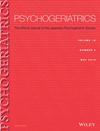针对中风后抑郁、生活质量和认知功能的认知行为疗法:系统回顾和荟萃分析
IF 1.7
4区 医学
Q3 GERIATRICS & GERONTOLOGY
引用次数: 0
摘要
中风后遗症很多,包括抑郁、生活质量下降和认知功能减退。除了药物治疗外,寻找一种非药物治疗方法来缓解后遗症也很重要。认知行为疗法(CBT)可能是一种潜在的候选疗法,可通过系统回顾和荟萃分析加以明确。系统综述和荟萃分析中的入选研究的合格标准是使用 CBT 治疗中风后抑郁,或侧重于中风后生活质量或认知功能的随机临床试验(RCT)。在随机效应模型中,抑郁、生活质量和认知功能量表的终点评分是最终荟萃分析的目标结果。共纳入了 10 项研究,包括 432 名接受 CBT 治疗的脑卒中后患者和 385 名对照组患者。荟萃分析结果显示,抑郁严重程度和生活质量均有显著改善。然而,CBT 组和对照组在认知功能方面没有发现明显差异。此外,荟萃分析还发现了明显的异质性。根据荟萃分析结果,CBT 可能对缓解抑郁严重程度和改善生活质量有益。然而,认知功能可能不受 CBT 的影响。为了澄清和确认 CBT 对卒中后抑郁和生活质量的治疗效果,有必要进一步开展样本量更大、设计更一致的 CBT 研究。本文章由计算机程序翻译,如有差异,请以英文原文为准。
Cognitive behavioural therapy for depression, quality of life, and cognitive function in the post‐stroke period: systematic review and meta‐analysis
The post‐stroke period is associated with a lot of sequelae, including depression, decreased quality of life, and decline of cognitive function. Apart from the pharmacotherapy, it is also important to find a non‐pharmacological treatment to relieve the sequelae. Cognitive behavioural therapy (CBT) might be a potential candidate, which can be clarified by a systematic review and meta‐analysis. The eligible criteria of enrolled studies in the systematic review and meta‐analysis were the randomised clinical trials (RCTs) using CBT to treat post‐stroke depression, or with the focus on quality of life or cognitive function in the post‐stroke period. The endpoint scores of depression, quality of life, and cognitive function scales were the targeted outcome for the final meta‐analysis in the random effects model. Ten RCTs with 432 post‐stroke patients receiving CBT and 385 controls were included. The meta‐analysis results showed significant improvements in depression severity and quality of life. However, no significant difference between CBT and control groups was found in cognitive function. In addition, significant heterogeneity was derived from the meta‐analysis. According to the meta‐analysis results, CBT might be beneficial for relieving depression severity and improving quality of life. However, cognitive function might not be influenced by CBT. Further studies with a more consistent CBT design with greater sample sizes should be warranted to clarify and confirm the treatment effects of CBT for post‐stroke depression and quality of life.
求助全文
通过发布文献求助,成功后即可免费获取论文全文。
去求助
来源期刊

Psychogeriatrics
Medicine-Geriatrics and Gerontology
CiteScore
3.60
自引率
5.00%
发文量
115
审稿时长
>12 weeks
期刊介绍:
Psychogeriatrics is an international journal sponsored by the Japanese Psychogeriatric Society and publishes peer-reviewed original papers dealing with all aspects of psychogeriatrics and related fields
The Journal encourages articles with gerontopsychiatric, neurobiological, genetic, diagnostic, social-psychiatric, health-political, psychological or psychotherapeutic content. Themes can be illuminated through basic science, clinical (human and animal) studies, case studies, epidemiological or humanistic research
 求助内容:
求助内容: 应助结果提醒方式:
应助结果提醒方式:


